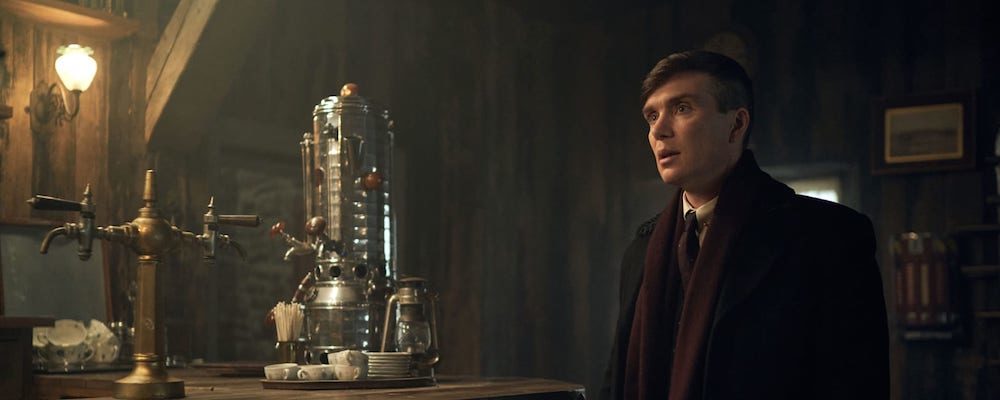‘Peaky Blinders’ Ends With Plenty of Villainy While Leaving the Door Open for More to Come
Alci Rengifo
Even great shows can have a difficult time trying to wind it all down. With all of the demands now common because of streaming and franchise addiction, you can’t just end the story. It must be left open-ended for the potential spinoff or movie. The sixth and final season of “Peaky Blinders” feels like a half-hearted conclusion because while some characters find the exit and a few plot points are settled, the overall narrative ends up in the air. With the expected upcoming film announced by creator Steven Knight, we can guess why it was decided to not completely drop the curtain. There’s still plenty here of what made this show a cult hit since it premiered in 2013, with its rich atmosphere and elegantly violent performances.
In continuing with the show’s recent political turn in season five, Tommy Shelby (Cillian Murphy), Irish Catholic and Romani leader of the Peaky Blinders street gang, is facing both the end of Prohibition and the rise of fascism. Last season he failed in his attempts to kill rising pro-Hitler politician Oswald Mosley (Sam Claflin). It’s now 1933 and in gloomy Birmingham, England, Tommy, now a Labour MP, is steering the family business from booze to drugs. Sibling Arthur (Paul Anderson) is going through drug and alcohol addiction due to his lingering World War I PTSD and wife leaving him. Tommy is going to spots like Newfoundland to negotiate potential business deals while trying to get his cousin Michael (Finn Cole) and Michael’s wife, Gina (Anya Taylor-Joy) to move opium into the United States. But Michael holds Tommy responsible for the death of his mother, Polly (the late Helen McCrory, who passed away in 2021), who died during the assassination attempt against Mosley and has sworn revenge.
While this final official season of “Peaky Blinders” lacks a total sense of finality, it’s still a riveting watch. The settings and performances, pulled off with the show’s trademark, meticulous craft, are enough to make us hope the movie is just as well-made. Yet there is a solid, running theme through out of reckonings and redemption. Even if Tommy and his Peaky Blinders are firmly anti-fascist, they still have to answer for all these years of murder and criminality. Per the rules of drama, even if the law doesn’t get you, fate will. The Murphy clan’s list of enemies now includes the IRA, Mosley and Mosley’s wife, Diana Mitford (Amber Anderson), a true fascist ideologue. Rival bootleggers now want to attack Tommy’s legitimate alcohol business as well. For only six episodes, the season packs a lot including Roma prophecies Polly left behind, Tommy suspecting someone has cursed his family when daughter Ruby (Heaven-Leigh Clee) falls ill with consumption and he suffers seizures. In addition to taking on criminal rivals and trying to get into the drug game, Tommy also gets close to Mosley and Diana, thinking he can best defeat the fascists by infiltrating them. An American crime boss, Jack Nelson (James Frecheville), who happens to be Gina’s uncle, is also thrown into the lineup as Tommy tries to expand into America. Tommy even has an estranged son introduced later in the season, which adds to rising strains in his marriage to Lizzie (Natasha O’Keeffe).
All of the running parallel plot lines, including Arthur’s addictions and Tommy’s growing sense of guilt, crescendo in a series of mini finales that also feel like set-ups. World War II is obviously on the horizon with Mosley openly praising Hitler and planning to marry Diana in Berlin. Tommy’s sister Ada (Sophie Rundle) is trying to become the thread that holds everyone together now that aunt Polly is gone. In such circumstances even family can’t be trusted and Tommy will even have Michael arrested for possession of opium, to send a message. By the final episodes Tommy learns there’s a price to pay and not all of his actions can remain covert. He will eventually be seduced by Diana, in an allegory about the dangers of dancing with fascism, which will put his marriage to Lizzie under extreme threat of ever surviving. Some of the material can feel a bit undercooked, like the eventual score-settling between Tommy and Michael, and Tommy’s own later decision to possibly break up the Peaky Blinders operation. There is an enjoyable moment in the finale where the Peaky Blinders boys give some fascists a good dose of righteous hot led. He wants to go away, unable to bear the burden of so much guilt and failure, especially after receiving a dire medical diagnosis. The final moments of the season simply don’t feel like a strong enough “finale” as Tommy discovers shocking information about his diagnosis that prompts him to burn his possessions and potentially return from self-imposed exile.
“Peaky Blinders” ranks alongside shows like “Boardwalk Empire” as well-crafted period TV that reached for some cinematic levels in its storytelling. Cillian Murphy had cunning intelligence as a gangster who also reads William Blake and can quote a verse or two while meeting with fellow criminals. Like many Peak TV dramas, it also morphed along with the times, feeling it necessary to become more political in light of the last few years. Fascism became a much more dangerous foe than the cops or bootleggers. For longtime fans this season will have much to enjoy even if some of it is half-formed. Maybe the slight sense of dissatisfaction stems from the feeling that this really isn’t the end of “Peaky Blinders” and it will soon transition into full franchise territory. Knight has reportedly confirmed the movie will begin filming in 2023, so until then, followers of the Murphys can enjoy this set of episodes which still pack plenty of engaging intrigue and villainy.
“Peaky Blinders” season six begins streaming June 10 on Netflix.

